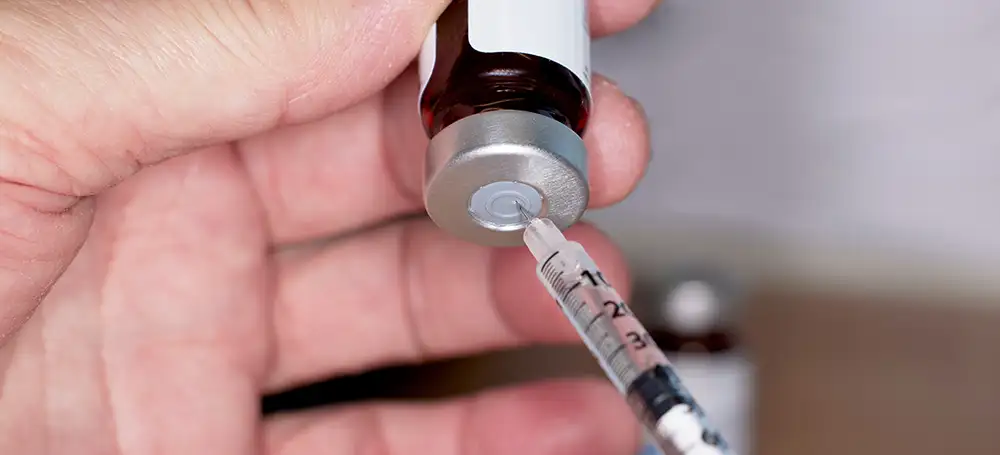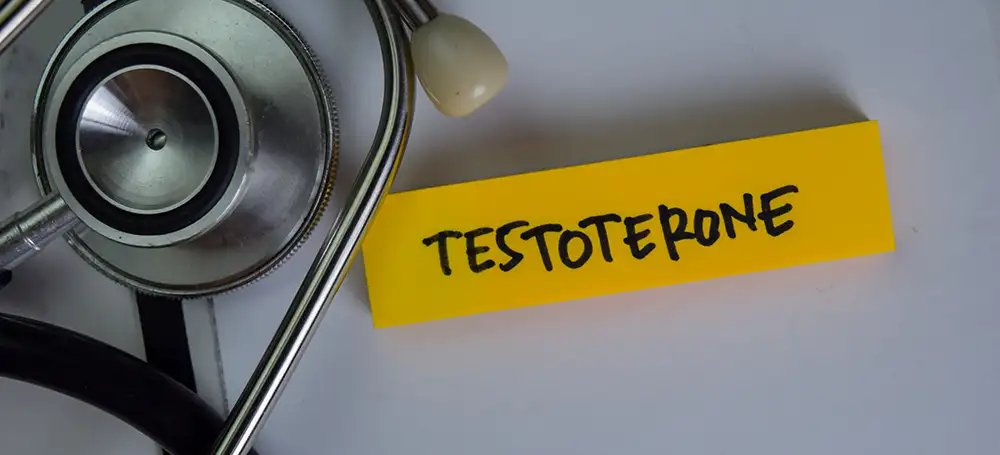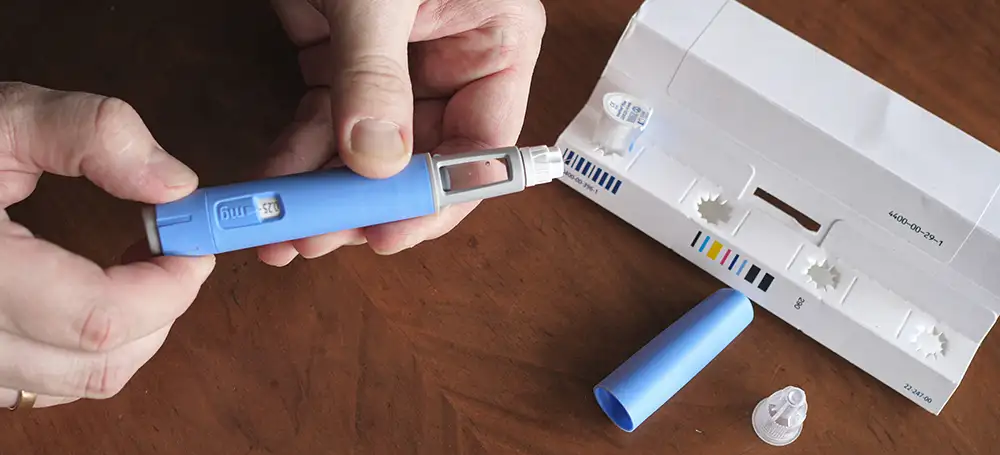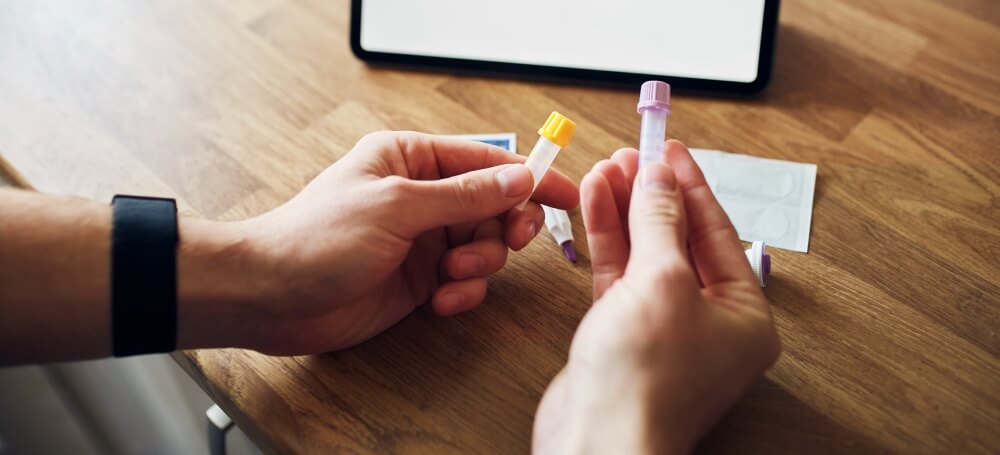You’ve seen internet ads for home test kits that promise to measure your testosterone levels. We’ve all seen them. And maybe you’ve been tempted to click on them once or twice. After all, you do feel yourself getting a little older. You run out of energy faster than you used to. And there was that time in the bedroom… well, you think, maybe it’s time to get your testosterone levels tested. What harm could it do? And those home tests certainly deliver a level of privacy, right? And if they advertise it online, they have to be safe. Right?
Hang on just a second. We certainly understand why men in Massachusetts might seek privacy and confidentiality when it comes to an admittedly sensitive matter like testosterone levels. But is a home test the right option? Let’s be honest here: No. It’s not the best option. Home tests for testosterone are less than reliable, they’re not comprehensive, and using them could even be harmful. As for privacy issues: you get all the privacy and confidentiality you seek at a men’s health clinic. Let’s dive deeper into the issues surrounding home testing for testosterone and explore what your reliable options actually are.
Low Testosterone Explained
Testosterone levels spike when you hit puberty (we all remember that!), and they typically stay high into your 30s. Beginning in your 30s, though, your testosterone levels start to drop naturally. The drop is very gradual, only 1% per year on average, but over time, it can add up. Once your testosterone levels drop below the normal range of 300 to 1,000 nanograms per deciliter, you can officially be diagnosed with testosterone deficiency.
Somewhere between your 40s and your 60s, you’re likely to feel the effects of this decline. You may realize you’re less interested in sex or experience sexual dysfunction, for starters.
But sexual symptoms are far from the only results of low testosterone levels. Perhaps you’ve been in a depressed or irritable mood with no real explanation. You could be low on energy, feeling fatigued more than you should. (And if you blame that feeling on your lack of good sleep, you might be surprised to learn that insomnia can be a symptom of low testosterone levels.) You’re likely to notice some weight gain and loss of muscle mass. You may notice that you’re experiencing memory lapses or finding it hard to concentrate.
It may be hard to believe that one hormone can be responsible for so many symptoms — but it’s true. The good news is that testing for testosterone levels is quite simple. But how should you have that testing done?
Testosterone Testing
Even if you check off every symptom on the list, you can’t know for sure that your testosterone levels are low without being tested. Blood tests provide the most accuracy, and your doctor will ask you to test in the morning, when testosterone levels are naturally at their highest. You may require a couple of tests to confirm any diagnosis.
But while testosterone testing is simple on your end, your doctor may want to use that vial of blood to check other hormone levels. After all, the endocrine system is immensely complex, and if testosterone isn’t normal (or even if it is), your symptoms could also be caused by imbalanced thyroid, human growth hormone (HGH) or other hormone levels. Your men’s health doctor can tie together these results to make a diagnosis.
Why Home Tests for Testosterone Aren’t the Best Choice
Home testosterone tests may indeed be the easiest choice. They only require a finger stick to get a drop of blood or perhaps an easy-peasy saliva sample. But you shouldn’t consider the results you get from these tests as definitive for many reasons, including:
- Home tests aren’t very accurate: In fact, if you’re being asked for a saliva sample, you shouldn’t consider the results even close to accurate. You may see wildly different results from a saliva sample and blood sample, even if they’re taken on the same day. You’re going to end up having to confirm any results with a legitimate test performed at a doctor’s office.
- Home tests don’t test everything you need to know about: Don’t be fooled if a home test promises to give you your “total testosterone” numbers. The word “total” may sound reassuring, but it’s just a word. You also need to have your levels of free testosterone tested. Some men’s results show normal total testosterone levels while having undetected low free testosterone levels. Your doctor can explain the difference and why it matters.
- Home tests are prone to user error: When your blood is taken at a medical office, special care is taken to protect your blood sample. A medical professional handles the sample carefully, wearing gloves, and everything is completely sterile and disinfected. You’re unlikely to take the same precautions at home — and could totally mess up the results by touching the test sample or closing the tube incorrectly. Any contamination invalidates your test results — then you’d have to head to your doctor’s office anyway.
A couple of other issues tilt you toward having your testing done properly at a men’s health clinic. Your doctor’s visit is likely to be covered by insurance — but a DIY test kit almost certainly won’t be covered. You could end up paying hundreds of dollars for home testing only to have to repeat everything.
And there’s a good reason insurance companies don’t cover home testing: they know that hormone testing is complex and requires a doctor’s involvement. When you go to a health care professional for testosterone testing, the test is accompanied by a full review of your medical history and a physical exam. All that information is necessary for an accurate diagnoses and appropriate treatment. Without it, you could easily end up with an inaccurate diagnosis and even with unneeded or potentially harmful “treatment.”
Discover your Testosterone levels
What If You Already Took a Home Test?
If you already took a home testosterone test, be aware that you can’t count on the accuracy of the results. Whether they concern you or you’re just worried about your symptoms, it’s now time to make an appointment with your men’s health clinic to get accurate testing — and, if needed, effective treatment.
Testing for Testosterone at Your Doctor’s Office
Whether you’ve done testing at home or not, your men’s health clinic follows a standard, respected procedure for determining your testosterone levels, creating an accurate diagnosis and deciding on a course of treatment, if required.
Your doctor wants to place your testosterone test results in context, so they begin by conducting a full medical exam. They look for any physical symptoms of low testosterone levels, including signs of obesity, metabolic syndrome, and changes to the size of your prostate gland, testicles and breasts. They compare your reports of physical symptoms to what they find during the exam.
Your doctor will also want to walk you through your medical history. In particular, they’ll want to know if you have any family history of low testosterone or cardiovascular problems. They’ll also want to know if you’ve experienced injury to your testicles or whether you’ve ever used corticosteroids or anabolic steroids.
Depending on your medical exam and history, your doctor may want to order extra tests to check not only your testosterone levels but also the function of your pituitary gland, which is inextricably involved in the production of testosterone.
Among the tests your doctor may order are tests for:
- Free testosterone
- A1C
- Hemoglobin
- Follicle-stimulating hormone (FSH)
- Estradiol
- Bone density
- Luteinizing hormone
- Prolactin
Treatment for Low Testosterone
If your doctor finds that you do indeed have low testosterone levels, they’ll offer you a range of options for testosterone replacement therapy. Depending on your personal choices and lifestyle, you might opt for:
- Testosterone gel: This mode of treatment involves applying gel to your skin (usually your upper arms) daily. It’s a good choice for men who have the discipline for a daily routine, but not a great option if you have small children at home who might decide to experiment with the gel themselves.
- Testosterone patches: Similar to testosterone gel, this mode of treatment, which is similar to a nicotine or seasickness patch, delivers testosterone through your skin. However, because you replace the patch every few days, you don’t have to deal with it daily.
- Testosterone injections: You can give these injections to yourself at home, or you can opt to come in to your men’s health clinic to receive them. They only need to be given every 1 to 2 weeks, depending on your dosage.
- Testosterone pellets: If you don’t want to think about your testosterone replacement therapy at all, you might opt for this mode of treatment. Small pellets are placed under your skin (usually below your buttocks), where they release testosterone gradually over several months.
What You Can Expect From Testosterone Replacement Therapy
During testosterone replacement therapy, your doctor monitors your blood levels and your symptoms to make sure your dosage is correct and make any needed tweaks. You can expect to see improvement within just a few weeks, with full improvement expected by 6 months. You may even find that symptoms you didn’t even recognize (such as fatigue) are starting to get better.
Most men discover that testosterone replacement therapy results in a combination of the following improvements:
- Improved sex drive
- Better, more stable mood, with decreased irritability
- Less sense of anxiety and depression
- Improved energy levels
- Decreased fatigue and exhaustion
- Improved muscle mass
- Loss of belly fat
- Improved ability to concentrate
- Improved memory
Is It Time to Have Your Testosterone Tested Properly?
If you test your testosterone at home using a DIY kit, you don’t know if your results are accurate. And if you try to treat yourself using supplements purchased online, based on the results of an at-home kit, you don’t know what you’re getting and could actually harm your body.
On the other hand, when you come to Boston Vitality, you can relax, knowing you’re getting proper, high-quality medical care. At Boston Vitality, we pay attention to your whole body health. That means we look for any side effects, monitor your overall health, provide accurate diagnoses, and make sure you’re getting the right dosages for your body. And yes, if you’re concerned about fertility in the future, we can address those concerns as well.
Don’t trust your health to some random website. Treat your body and your sexual health with the respect it deserves by making an appointment at Boston Vitality. Whether you’re concerned about recovering your sex drive, boosting your energy levels, fighting the effects of aging, or maintaining mental clarity, we are here for you. Contact us today for testosterone testing or any other men’s health concerns.












